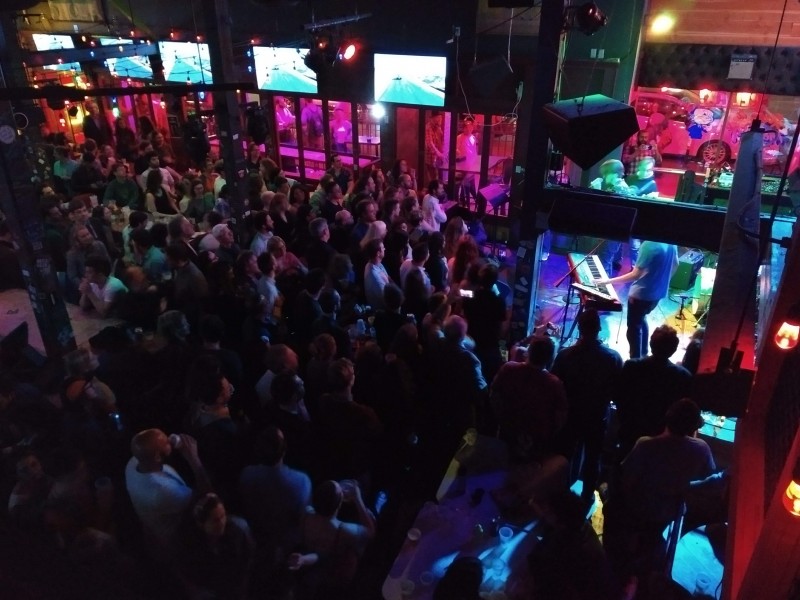Ocean Sciences 2020 - San Diego
Lianne Harrison
British Antarctic Survey

I attended my first major scientific conference in February 2020: Ocean Sciences. Firstly, I have never been to a conference that was so overwhelmingly huge! The sheer size of the poster hall alone was enough to leave me dazed and stunned. I have actually only ever been to a single symposium that had parallel sessions before this and that still had less than 100 people split across three sessions. All the other conferences I have attended have been small and specialised enough to have a single session to keep all participants interested. Ocean Sciences was a whole new level for me.
This had the unexpected benefit of expanding my horizons and allowing me to experience different types of research other than my own field. While I attended many talks in sessions about melting glaciers and their effects on ocean dynamics, high resolution modelling and ocean tides, which all tie into my own research neatly, I also went to a diverse and incredibly interesting panel session about solutions to the world’s ocean-related challenges. This covered topics such as working towards conservation through marine protected areas and innovative methods to clean up ocean plastics.
The second day was the best of the conference for me; I had a successful afternoon presenting my poster in the High Latitude Environments session and met some new researchers who seemed keen to learn about what findings had come out of my PhD research so far. They even gave me some ideas about new avenues I could go down in future. After this session, the convenors had organised a meal out for us to get to know people in our field better. We walked through the vibrant streets of the Gaslamp Quarter, across the street from the convention centre, and went for a burger at a courtyard bar constructed from old shipping containers! After this, we headed for the jam session. Ocean scientists took to the stage at an open mic night in a local bar to showcase their musical talents. It was such a fun atmosphere and although my view of the stage wasn’t great (as you can see from the photo), I could hear the talent just fine!
A highlight of the conference for me was a mid-week career panel which focussed on career paths outside of academia. I had the opportunity to hear from people who worked for funding councils, NGOs and even someone who had started his own company when he couldn’t find the perfect job once he had qualified. A lot of the careers advice I have received throughout my PhD so far has focussed on how to successfully stay in academia, so this was a useful session to give me an idea of what else I might be able to do when I finish my PhD later this year.
I learned a lot from this meeting and enjoyed the variety of activities and talks on offer. The opening plenary by Nainoa Thompson, who had been motivated by his trip round the world to do more to combat climate change and improve the health of our oceans, was inspiring. The setting was amazing, with opportunities to take walks along the harbour front during lunch breaks to get a bit of warmth and sunshine (in February, in the northern hemisphere! As a Brit this was a rare and delightful treat.) Even the airplane ride home was an experience; seemingly half my department had travelled to the meeting and I felt like I knew every other person on the plane after making new friends at the conference. All in all, it was a very valuable and worthwhile trip!
Finally, I would like to express my gratitude to the Challenger Society for granting me a Travel Award, without which, this wonderful experience would not have been possible.
I am in the final year of my PhD, based at the British Antarctic Survey in collaboration with the University of East Anglia. My research has investigated the sensitivity of Larsen C Ice Shelf, Antarctica, to ocean warming using a high resolution model with a new seabed. My simulations have helped to determine whether changes in oceanic processes have led to satellite observed lowering of the ice shelf in recent decades. Before this, I gained a Masters and Bachelors of Physics from the University of Leeds.
Latest News
Royal Society Publishing Photography Competition 2025
Please see a message from the Royal Society below:
We are delighted to announce that the 2025 Competition is now open for entries until 15 August for a chance to win £1000! The competition celebrates the power of photography in conveying the wonder of science happening all around us and photographs can be submitted in the categories of: Astronomy, Behaviour, Earth Science and Climatology, Ecology and Environmental Science, and Microimaging.
The competition is free to enter and open to anyone studying or working in science at graduate level or above. Category winners will receive a one-year membership to the Royal Photographic Society and the overall winner will receive a grand prize of £1,000. Find out more: https://bit.ly/RSPphotocomp
October 2025 MEDIN Workshop: Marine Data Management, Governance and the MEDIN toolset
The Marine Environmental Data and Information Network (MEDIN) are pleased to announce that registration is now open for the next occurrence of our popular free online training workshop: ‘Marine Data Management, Governance and the MEDIN toolset’ on the 13th – 17th October 2025 on OceanTeacher Global Academy.
Marine Data Management, Governance and the MEDIN toolset
The Marine Environmental Data and Information Network (MEDIN) and OceanWise are delighted to invite you to attend our popular free online training workshop: ‘Marine Data Management, Governance and the MEDIN toolset’ on the 19th – 23rd of May 2025.
